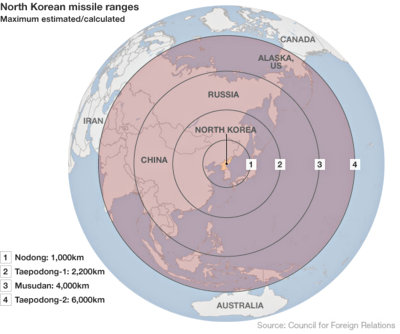Or Kim Jong Un may not fully understand the power which he wields.
I don't know: and am very glad that someone else has to make 'go/no go' decisions for America's military. I'll get back to that.
Living with Uncertainty
Someone on the American president's national security staff said "it's extremely unlikely" that North Korea has a missile which could reach the United States with a nuclear warhead.1 I think he's right, but I also think a key word in the statement is "unlikely."
(from BBC News, used w/o permission)
North Korea wouldn't have to hit Los Angeles or Portland to reach the United States. Parts of Alaska and Hawaii are within range of that country's Taepodong missile.
So is quite a bit of Asia and the western Pacific, if Kim Jong Un decided to attack a "puppet group."
'Might Not,' 'May Not,' Could be,' and Experts
A missile attack needs more than a missile, though. North Korea would need a warhead: preferably, from Kim Jong Un's point of view, a nuclear weapon. His people have developed nuclear bombs: but may not have been able to make them small enough to fit in a missile.On the other hand, maybe they have.
I'm not concerned for my immediate personal safety. I live near the center of the North American continent, well away from anything that might be a high-value target.
Besides, North Korea's long-range missiles might not be accurate enough to hit a particular target. The country may not have a nuclear bomb compact enough for a missile. Kim Jong Un could be bluffing.
That's a lot of "might not, "may not," and "could be."
What if the 'experts' are wrong?
Warm and Sunny With a Chance of Nuclear Attack
Let's say North Korea's military has a nuclear weapon which will reach Guam. It's a United States territory, not a state: but closer than Anchorage or Honolulu. It might look like a good place to punish 'imperialists.'About 44,000 folks live in Dededo, Guam. It's got schools, libraries, and a shopping mall: hardly New York City, but ten times larger than the town I call home.

(from en.wikipedia.org/wiki/File:Micronesia_Mall1.JPG, used w/o permission)
Dededo covers quite a wide area, so a bomb as powerful as the one that hit Hiroshima might not kill everyone there. On the other hand, it would be an extremely unpleasant experience for survivors.

(from en.wikipedia.org/wiki/File:Hiroshima_Damage_Map.png, used w/o permission)
I suppose it could be argued that folks living in Dededo 'deserve' to be killed, since they are either 'imperialists' or in league with the United States.
I think that makes as much sense saying that God killed Haitians in 2010 for something (allegedly) done two centuries earlier: or that Yankee imperialists caused the quake.2
Decisions, Responsibility
As of Wednesday, April 3, a Terminal High Altitude Area Defense (THAAD) missile interceptor system is on its way to Guam. It's expensive, and might not stop an incoming missile attack.But I think deploying THAAD makes sense. Strategic and tactical considerations aside, it would be nice if folks living in Guam had a little protection.
As I've said before, this isn't a 'political' blog, in the sense that I claim one person or group is always right, and everyone who disagrees is icky. I sometimes discuss political issues, since politics is a means by which some decisions are made.
I did not vote for the current American president, but think that some decisions made during this administration were correct: like sending a THAAD system to Guam.
War, in my considered opinion, is something to avoid. But sometimes using armed force is preferable to the alternative. One of the responsibilities of national authorities is defending their nation: even when force is necessary.3
I suppose Kim Jong Un may think that he is 'defending' his territory. I think he is wrong.
"International Authority" and Looking Ahead
Today, "there is no international authority with the necessary competence and power"4 to restrain the likes of Kim Jong Un or Al Qaeda. Eventually I hope that humanity develops something like Tennyson's "Federation of the world." Until that happens, we'll have to make do with nations like the United States - and North Korea - and international organizations like the United Nations and NATO.I've discussed some of my hopes in other blogs.
Related posts:
- Living today
- "About North Korea, Power, Risks, and Leadership"
(April 2, 2013) - "Kim Jong Il is Dead: North Korea's Ruling Dynasty's Third Generation"
(December 19, 2011) - " 'Just War:' Unpleasant, but Not a Contradiction in Terms"
A Catholic Citizen in American (March 22, 2011) - "Conservative? Liberal? Democrat? Republican? No, I'm Catholic"
A Catholic Citizen in American (November 3, 2008) - "Preemptive Strike: Am I a Hawk, or a Dove?"
(September 21, 2007)
- "About North Korea, Power, Risks, and Leadership"
- Building tomorrow
- " 'Arrogant Scoundrels,' 'People Who Care,' and Me"
A Catholic Citizen in America (March 10, 2013) - "Prayer, Technology, and Looking Ahead"
A Catholic Citizen in America (February 24, 2013)
Particularly - "Common Sense and New Light 'Bulbs' "
A Catholic Citizen in America (December 3, 2012)
Particularly - "South Sudan, the Táin Bó Cúalnge, and Working for a Better World"
A Catholic Citizen in America (January 6, 2012) - " 'The future ain't what it used to be.' Probably Just as Well"
Apathetic Lemming of the North (August 30, 2009)
- " 'Arrogant Scoundrels,' 'People Who Care,' and Me"
1 Excerpts from news and views:
"North Korea lacks means for nuclear strike on U.S., experts say"2 Yes, they really said that:
Mark Hosenball, Phil Stewart, Reuters (April 5, 2013)
"North Korea's explicit threats this week to strike the United States with nuclear weapons are rhetorical bluster, as the isolated nation does not yet have the means to make good on them, Western officials and security experts say.
"Pyongyang has slowly and steadily improved its missile capabilities in recent years and U.S. officials say its missiles may be capable of hitting outlying U.S. territories and states, including Guam, Alaska and Hawaii.
"Some private experts say even this view is alarmist. There is no evidence, the officials say, that North Korea has tested the complex art of miniaturizing a nuclear weapon to be placed on a long-range missile, a capability the United States, Russia, China and others achieved decades ago.
"In other words, North Korea might be able to hit some part of the United States, but not the mainland and not with a nuclear weapon.
"The threats against the United States by North Korea's young leader Kim Jong-un are 'probably all bluster,' said Gary Samore, until recently the top nuclear proliferation expert on President Barack Obama's national security staff.
" 'It's extremely unlikely they have a nuclear missile which could reach the United States,' said Samore.
"The North Koreans 'are not suicidal. They know that any kind of direct attack (on the United States) would be end of their country,' said Samore, now at Harvard University's Kennedy School.
"On Wednesday, North Korea's state-run KCNA news agency said its military had 'ratified' an attack involving 'cutting-edge smaller, lighter and diversified nuclear strike means,' an apparent reference to miniaturized nuclear weapons...."
"Korea crisis: UN's Ban warns of 'serious implications' "
BBC News (April 4, 2013)
"UN Secretary General Ban Ki-moon has appealed to North Korea to change course, saying it has "gone too far" in its rhetoric.
"He said he was concerned any 'unwanted crisis' on the Korean peninsula would have 'very serious implications'.
"The warning came hours after South Korea's foreign minister said the North had shifted a missile with 'considerable range' to its east coast.
"Pyongyang earlier renewed threats of a nuclear strike against the US.
"However, its missiles are not believed to be capable of carrying nuclear warheads.
"White House spokesman Jay Carney described the threats as 'regrettable but familiar', adding the US was taking 'all the necessary precautions'...."
"U.S. Military to Deploy Missile Defense Battery Amid Looming Budget Cuts"
Mike Gruss, Space News, via Space.com (April 4, 2013)
"The U.S. Defense Department plans to deploy a Terminal High Altitude Area Defense (THAAD) missile interceptor system to Guam in the coming weeks to defend the U.S. territory against a possible North Korean missile attack, the Pentagon announced Wednesday (April 3).
"In October, the THAAD system had its first-ever intercept of a medium-range missile. In recent weeks, North Korea has renounced the 1953 armistice that ended the Korean War, closed its borders to South Korean workers, severed a diplomatic hotline with Seoul and threatened to launch missiles at U.S. targets.
"Pyongyang has been steadily escalating its war rhetoric since a satellite launch in December and nuclear test in February drew widespread condemnation and tighter sanctions...."
- "Haiti's Earthquake Caused by - You Guessed it - Yankee Imperialists"
Apathetic Lemming of the North (January 21, 2010) - "Haiti: Voodoo, Pat Robertson, and the Catholic Church"
A Catholic Citizen in America (January 16, 2010)
Particularly - "Pat Robertson, the Devil, Haiti, and an Alternate Reality?"
Apathetic Lemming of the North (January 14, 2010)
4 Catechism of the Catholic Church, 2308.
